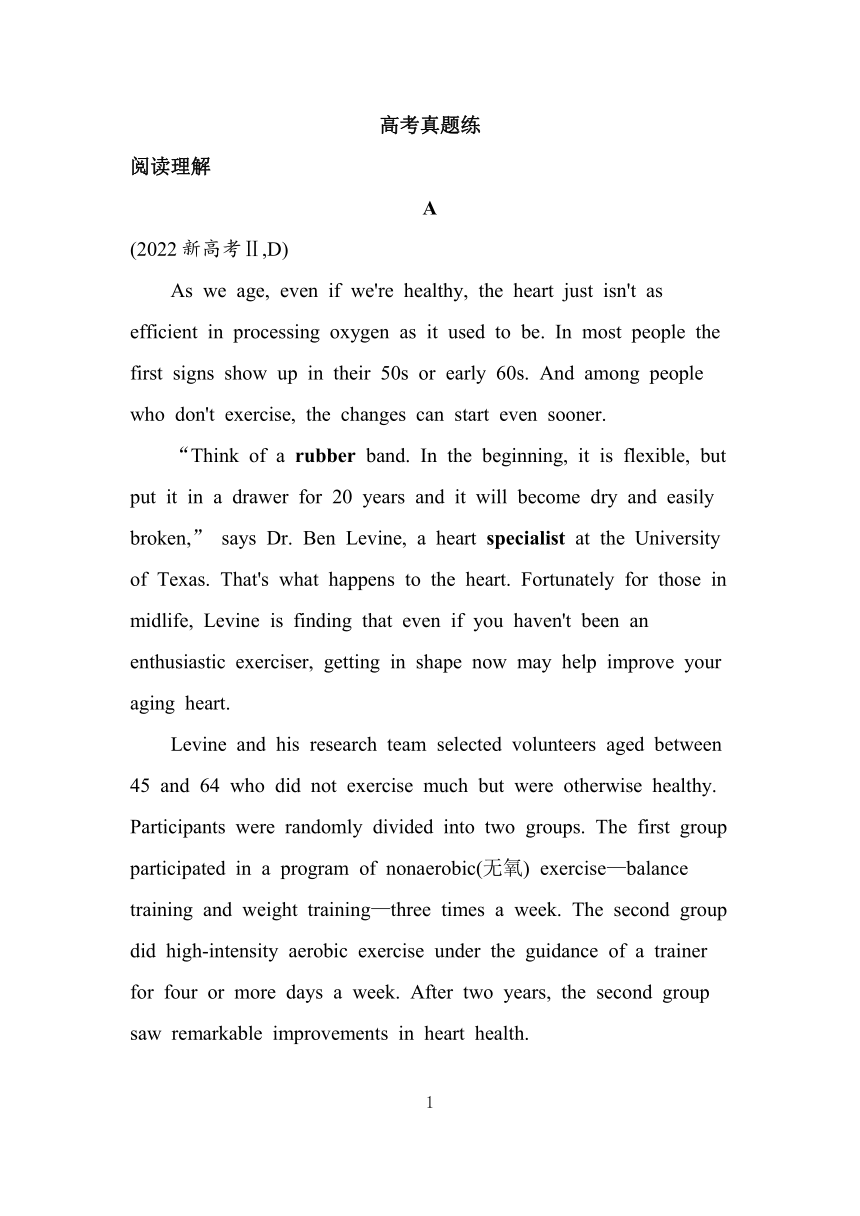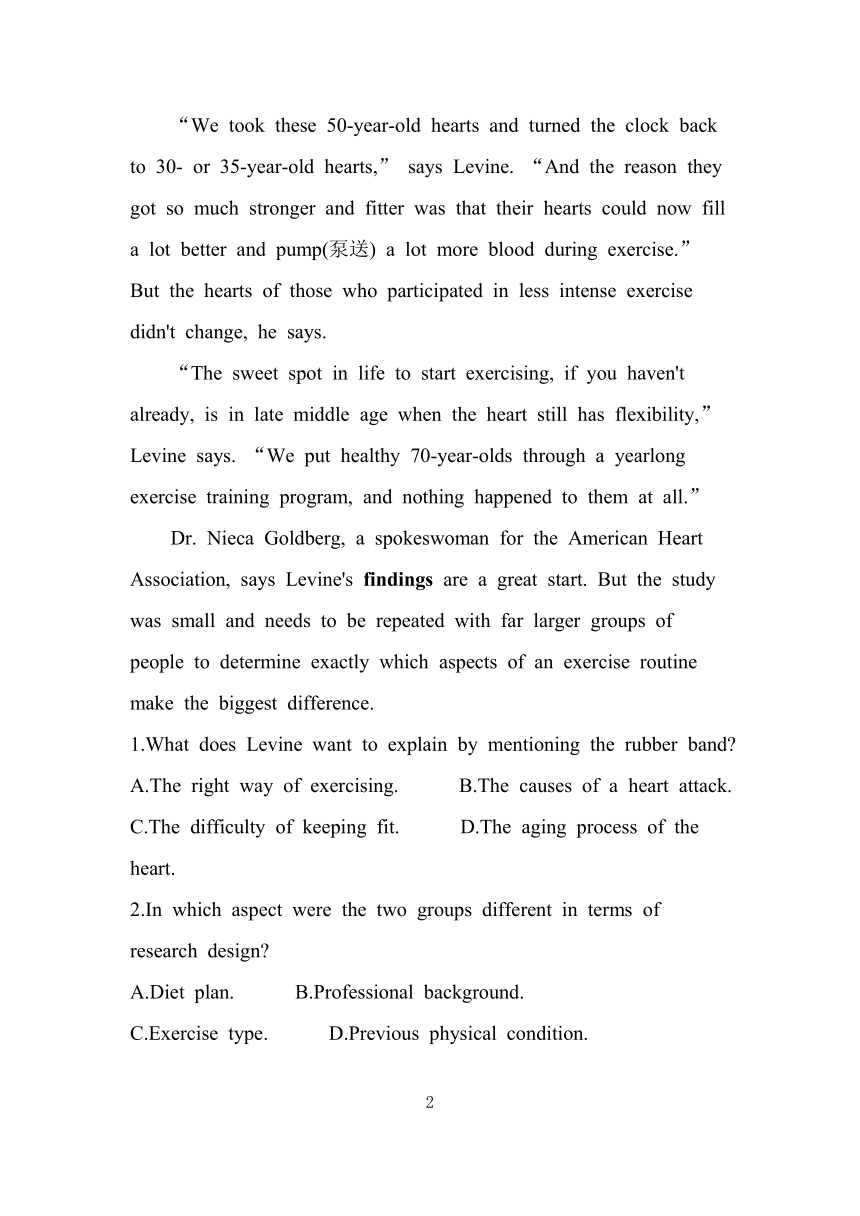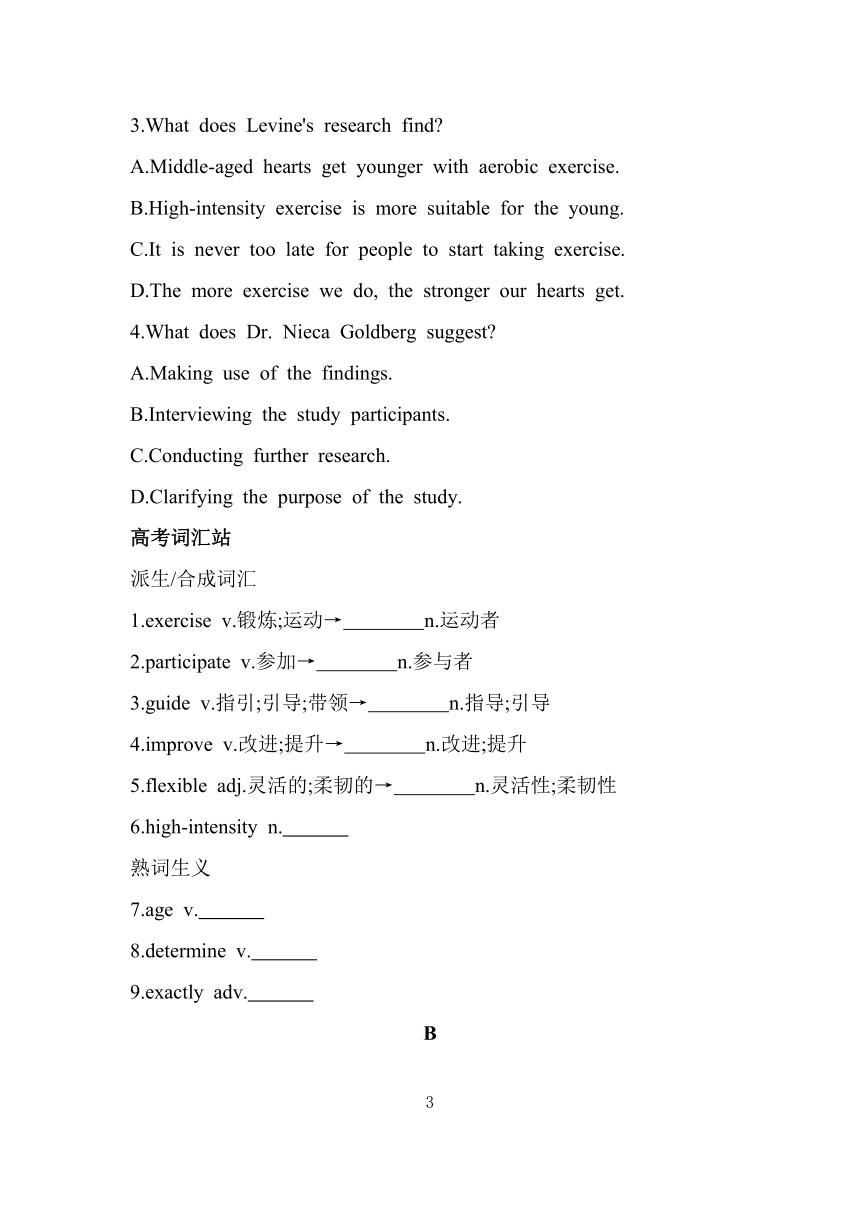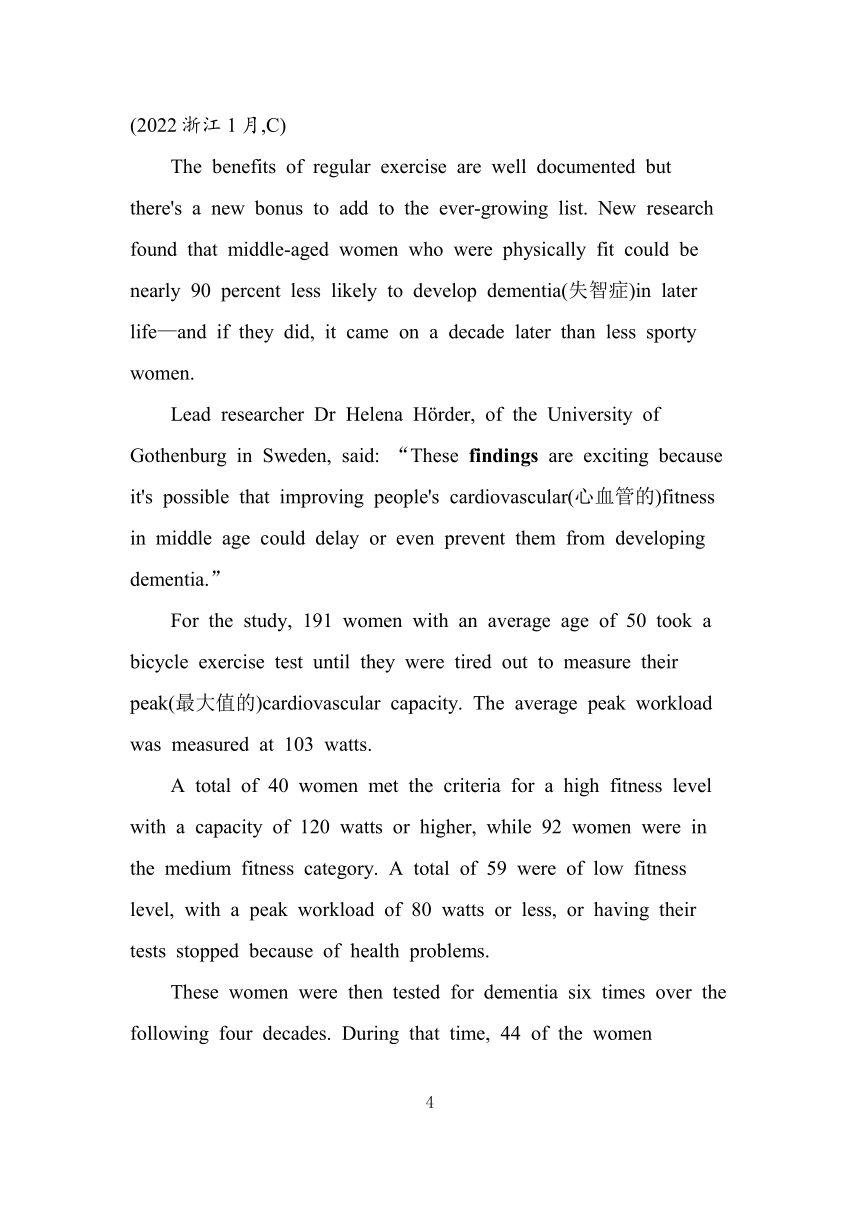译林版选择性必修二Unit 3 高考真题练(含解析)
文档属性
| 名称 | 译林版选择性必修二Unit 3 高考真题练(含解析) |  | |
| 格式 | docx | ||
| 文件大小 | 30.3KB | ||
| 资源类型 | 试卷 | ||
| 版本资源 | 牛津译林版(2019) | ||
| 科目 | 英语 | ||
| 更新时间 | 2025-07-09 18:26:47 | ||
图片预览




文档简介
高考真题练
阅读理解
A
(2022新高考Ⅱ,D)
As we age, even if we're healthy, the heart just isn't as efficient in processing oxygen as it used to be. In most people the first signs show up in their 50s or early 60s. And among people who don't exercise, the changes can start even sooner.
“Think of a rubber band. In the beginning, it is flexible, but put it in a drawer for 20 years and it will become dry and easily broken,” says Dr. Ben Levine, a heart specialist at the University of Texas. That's what happens to the heart. Fortunately for those in midlife, Levine is finding that even if you haven't been an enthusiastic exerciser, getting in shape now may help improve your aging heart.
Levine and his research team selected volunteers aged between 45 and 64 who did not exercise much but were otherwise healthy. Participants were randomly divided into two groups. The first group participated in a program of nonaerobic(无氧) exercise—balance training and weight training—three times a week. The second group did high-intensity aerobic exercise under the guidance of a trainer for four or more days a week. After two years, the second group saw remarkable improvements in heart health.
“We took these 50-year-old hearts and turned the clock back to 30- or 35-year-old hearts,” says Levine. “And the reason they got so much stronger and fitter was that their hearts could now fill a lot better and pump(泵送) a lot more blood during exercise.” But the hearts of those who participated in less intense exercise didn't change, he says.
“The sweet spot in life to start exercising, if you haven't already, is in late middle age when the heart still has flexibility,” Levine says. “We put healthy 70-year-olds through a yearlong exercise training program, and nothing happened to them at all.”
Dr. Nieca Goldberg, a spokeswoman for the American Heart Association, says Levine's findings are a great start. But the study was small and needs to be repeated with far larger groups of people to determine exactly which aspects of an exercise routine make the biggest difference.
1.What does Levine want to explain by mentioning the rubber band
A.The right way of exercising. B.The causes of a heart attack.
C.The difficulty of keeping fit. D.The aging process of the heart.
2.In which aspect were the two groups different in terms of research design
A.Diet plan. B.Professional background.
C.Exercise type. D.Previous physical condition.
3.What does Levine's research find
A.Middle-aged hearts get younger with aerobic exercise.
B.High-intensity exercise is more suitable for the young.
C.It is never too late for people to start taking exercise.
D.The more exercise we do, the stronger our hearts get.
4.What does Dr. Nieca Goldberg suggest
A.Making use of the findings.
B.Interviewing the study participants.
C.Conducting further research.
D.Clarifying the purpose of the study.
高考词汇站
派生/合成词汇
1.exercise v.锻炼;运动→ n.运动者
2.participate v.参加→ n.参与者
3.guide v.指引;引导;带领→ n.指导;引导
4.improve v.改进;提升→ n.改进;提升
5.flexible adj.灵活的;柔韧的→ n.灵活性;柔韧性
6.high-intensity n.
熟词生义
7.age v.
8.determine v.
9.exactly adv.
B
(2022浙江1月,C)
The benefits of regular exercise are well documented but there's a new bonus to add to the ever-growing list. New research found that middle-aged women who were physically fit could be nearly 90 percent less likely to develop dementia(失智症)in later life—and if they did, it came on a decade later than less sporty women.
Lead researcher Dr Helena H rder, of the University of Gothenburg in Sweden, said: “These findings are exciting because it's possible that improving people's cardiovascular(心血管的)fitness in middle age could delay or even prevent them from developing dementia.”
For the study, 191 women with an average age of 50 took a bicycle exercise test until they were tired out to measure their peak(最大值的)cardiovascular capacity. The average peak workload was measured at 103 watts.
A total of 40 women met the criteria for a high fitness level with a capacity of 120 watts or higher, while 92 women were in the medium fitness category. A total of 59 were of low fitness level, with a peak workload of 80 watts or less, or having their tests stopped because of health problems.
These women were then tested for dementia six times over the following four decades. During that time, 44 of the women developed dementia. Five percent of the highly fit women developed dementia, compared to 25 percent of the women with medium fitness and 32 percent of the women with low fitness.
“However, this study does not show cause and effect between cardiovascular fitness and dementia, it only shows an association,” said H rder. “More research is needed to see if improved fitness could have a positive effect on the risk of dementia and also to look at when during a lifetime a high fitness level is most important.” She also admitted that a relatively small number of women were studied, all of whom were from Sweden, so the results might not be applicable to other groups.
5.What is on the ever-growing list mentioned in the first paragraph
A.Positive effects of doing exercise.
B.Exercises suitable for the middle-aged.
C.Experimental studies on dementia.
D.Advantages of sporty women over men.
6.Why did the researchers ask the women to do bicycle exercise
A.To predict their maximum heart rate.
B.To assess their cardiovascular capacity.
C.To change their habit of working out.
D.To detect their potential health problems.
7.What do we know about Dr H rder's study
A.It aimed to find a cure for dementia.
B.Data collection was a lengthy process.
C.Some participants withdrew from it.
D.The results were far from satisfactory.
8.Which of the following is the best title for the text
A.More Women Are Exercising to Prevent Dementia
B.Middle-Aged Women Need to Do More Exercise
C.Fit Women Are Less Likely to Develop Dementia
D.Biking Improves Women's Cardiovascular Fitness
高考词汇站
派生/合成词汇
1.physical adj.身体的→ adv.身体上
2.sport n.体育运动→ adj.擅长体育运动的
3.fit adj.健康的→ n.健康
4.relative adj.相比较而言的;相对的→ adv.相当地;相对地
5.apply v.应用→ adj.适用的
6.ever-growing adj.
7.middle-aged adj.
熟词生义
8.document v.
9.develop v.
答案与分层梯度式解析
Unit 3 Fit for life
高考真题练
A
◎语篇解读 本文是一篇说明文。文章介绍了随着我们变老,心脏也随之变得不如过去高效,但是锻炼能够改善变老的心脏。
1.D 推理判断题。根据文章第二段中“Think of a rubber band. In the beginning, it is flexible, but put it in a drawer for 20 years and it will become dry and easily broken”(想想橡皮圈。一开始,它是灵活的,但是把它放到抽屉20年,它将变干并且容易坏掉)以及“That's what happens to the heart.”(那就是心脏的变化)可知答案为D项。
2.C 细节理解题。根据文章第三段中“The first group participated in a program of nonaerobic exercise—balance training and weight training—three times a week.The second group did high-intensity aerobic exercise under the guidance of a trainer for four or more days a week.”可知第一组做无氧运动,第二组做有氧运动,所以答案为C项。
3.A 推理判断题。根据文章第四段中“We took these 50-year-old hearts and turned the clock back to 30- or 35-year-old hearts,”says Levine. “And the reason they got so much stronger and fitter was that their hearts could now fill a lot better and pump a lot more blood during exercise.”(我们让这些50岁的心脏回到30或35岁的状态……他们变得更强壮、更健康的原因是在锻炼中他们的心脏现在能够填充得更好并且泵送更多的血液),可知答案为A项。
4.C 推理判断题。根据文章最后一段中“But the study was small and needs to be repeated with far larger groups of people to determine exactly which aspects of an exercise routine make the biggest difference.”(但是这个研究是小范围的,需要在更大的人群中重复进行来准确确定日常锻炼对哪些方面最有影响),可知答案为C项。
【高考词汇站】 1.exerciser 2.participant 3.guidance
4.improvement 5.flexibility 6.高强度 7.变老;衰老
8.确定 9.究竟
长难句
原句 Fortunately for those in midlife, Levine is finding that even if you haven't been an enthusiastic exerciser, getting in shape now may help improve your aging heart.
分析 本句为主从复合句。that引导宾语从句,even if引导让步状语从句,动名词短语getting in shape 作主语。
译文 对于那些中年人来说幸运的是,Levine发现即使你不是一个热衷于运动的人,现在保持体形可能有助于改善你正在老化的心脏。
B
◎语篇解读 本文为说明文。文章介绍了身体健康的中年女性在晚年患失智症的可能性较低,但这一结论有局限性。
5.A 细节理解题。根据第一段中的“The benefits of regular exercise are well documented”可知锻炼有益处,即有积极的影响。故选A项。
6.B 细节理解题。根据第三段中的“measure their peak cardiovascular capacity”可知让这些女性骑自行车的目的是测量她们的心血管能力,从而做出评估,故选B项。
7.B 推理判断题。根据第五段中的“These women were then tested for dementia six times over the following four decades.”可知这项研究对数据的搜集持续的时间很长,故选B项。
8.C 主旨大意题。根据文章的主题句“...middle-aged women who were physically fit could be nearly 90 percent less likely to develop dementia in later life...”可知,身体健康的女性在晚年患失智症的可能性较低。故选C项。
【高考词汇站】 1.physically 2.sporty 3.fitness
4.relatively 5.applicable 6.日益增长的 7.中年的 8.记录;记载 9.患(病)
6
阅读理解
A
(2022新高考Ⅱ,D)
As we age, even if we're healthy, the heart just isn't as efficient in processing oxygen as it used to be. In most people the first signs show up in their 50s or early 60s. And among people who don't exercise, the changes can start even sooner.
“Think of a rubber band. In the beginning, it is flexible, but put it in a drawer for 20 years and it will become dry and easily broken,” says Dr. Ben Levine, a heart specialist at the University of Texas. That's what happens to the heart. Fortunately for those in midlife, Levine is finding that even if you haven't been an enthusiastic exerciser, getting in shape now may help improve your aging heart.
Levine and his research team selected volunteers aged between 45 and 64 who did not exercise much but were otherwise healthy. Participants were randomly divided into two groups. The first group participated in a program of nonaerobic(无氧) exercise—balance training and weight training—three times a week. The second group did high-intensity aerobic exercise under the guidance of a trainer for four or more days a week. After two years, the second group saw remarkable improvements in heart health.
“We took these 50-year-old hearts and turned the clock back to 30- or 35-year-old hearts,” says Levine. “And the reason they got so much stronger and fitter was that their hearts could now fill a lot better and pump(泵送) a lot more blood during exercise.” But the hearts of those who participated in less intense exercise didn't change, he says.
“The sweet spot in life to start exercising, if you haven't already, is in late middle age when the heart still has flexibility,” Levine says. “We put healthy 70-year-olds through a yearlong exercise training program, and nothing happened to them at all.”
Dr. Nieca Goldberg, a spokeswoman for the American Heart Association, says Levine's findings are a great start. But the study was small and needs to be repeated with far larger groups of people to determine exactly which aspects of an exercise routine make the biggest difference.
1.What does Levine want to explain by mentioning the rubber band
A.The right way of exercising. B.The causes of a heart attack.
C.The difficulty of keeping fit. D.The aging process of the heart.
2.In which aspect were the two groups different in terms of research design
A.Diet plan. B.Professional background.
C.Exercise type. D.Previous physical condition.
3.What does Levine's research find
A.Middle-aged hearts get younger with aerobic exercise.
B.High-intensity exercise is more suitable for the young.
C.It is never too late for people to start taking exercise.
D.The more exercise we do, the stronger our hearts get.
4.What does Dr. Nieca Goldberg suggest
A.Making use of the findings.
B.Interviewing the study participants.
C.Conducting further research.
D.Clarifying the purpose of the study.
高考词汇站
派生/合成词汇
1.exercise v.锻炼;运动→ n.运动者
2.participate v.参加→ n.参与者
3.guide v.指引;引导;带领→ n.指导;引导
4.improve v.改进;提升→ n.改进;提升
5.flexible adj.灵活的;柔韧的→ n.灵活性;柔韧性
6.high-intensity n.
熟词生义
7.age v.
8.determine v.
9.exactly adv.
B
(2022浙江1月,C)
The benefits of regular exercise are well documented but there's a new bonus to add to the ever-growing list. New research found that middle-aged women who were physically fit could be nearly 90 percent less likely to develop dementia(失智症)in later life—and if they did, it came on a decade later than less sporty women.
Lead researcher Dr Helena H rder, of the University of Gothenburg in Sweden, said: “These findings are exciting because it's possible that improving people's cardiovascular(心血管的)fitness in middle age could delay or even prevent them from developing dementia.”
For the study, 191 women with an average age of 50 took a bicycle exercise test until they were tired out to measure their peak(最大值的)cardiovascular capacity. The average peak workload was measured at 103 watts.
A total of 40 women met the criteria for a high fitness level with a capacity of 120 watts or higher, while 92 women were in the medium fitness category. A total of 59 were of low fitness level, with a peak workload of 80 watts or less, or having their tests stopped because of health problems.
These women were then tested for dementia six times over the following four decades. During that time, 44 of the women developed dementia. Five percent of the highly fit women developed dementia, compared to 25 percent of the women with medium fitness and 32 percent of the women with low fitness.
“However, this study does not show cause and effect between cardiovascular fitness and dementia, it only shows an association,” said H rder. “More research is needed to see if improved fitness could have a positive effect on the risk of dementia and also to look at when during a lifetime a high fitness level is most important.” She also admitted that a relatively small number of women were studied, all of whom were from Sweden, so the results might not be applicable to other groups.
5.What is on the ever-growing list mentioned in the first paragraph
A.Positive effects of doing exercise.
B.Exercises suitable for the middle-aged.
C.Experimental studies on dementia.
D.Advantages of sporty women over men.
6.Why did the researchers ask the women to do bicycle exercise
A.To predict their maximum heart rate.
B.To assess their cardiovascular capacity.
C.To change their habit of working out.
D.To detect their potential health problems.
7.What do we know about Dr H rder's study
A.It aimed to find a cure for dementia.
B.Data collection was a lengthy process.
C.Some participants withdrew from it.
D.The results were far from satisfactory.
8.Which of the following is the best title for the text
A.More Women Are Exercising to Prevent Dementia
B.Middle-Aged Women Need to Do More Exercise
C.Fit Women Are Less Likely to Develop Dementia
D.Biking Improves Women's Cardiovascular Fitness
高考词汇站
派生/合成词汇
1.physical adj.身体的→ adv.身体上
2.sport n.体育运动→ adj.擅长体育运动的
3.fit adj.健康的→ n.健康
4.relative adj.相比较而言的;相对的→ adv.相当地;相对地
5.apply v.应用→ adj.适用的
6.ever-growing adj.
7.middle-aged adj.
熟词生义
8.document v.
9.develop v.
答案与分层梯度式解析
Unit 3 Fit for life
高考真题练
A
◎语篇解读 本文是一篇说明文。文章介绍了随着我们变老,心脏也随之变得不如过去高效,但是锻炼能够改善变老的心脏。
1.D 推理判断题。根据文章第二段中“Think of a rubber band. In the beginning, it is flexible, but put it in a drawer for 20 years and it will become dry and easily broken”(想想橡皮圈。一开始,它是灵活的,但是把它放到抽屉20年,它将变干并且容易坏掉)以及“That's what happens to the heart.”(那就是心脏的变化)可知答案为D项。
2.C 细节理解题。根据文章第三段中“The first group participated in a program of nonaerobic exercise—balance training and weight training—three times a week.The second group did high-intensity aerobic exercise under the guidance of a trainer for four or more days a week.”可知第一组做无氧运动,第二组做有氧运动,所以答案为C项。
3.A 推理判断题。根据文章第四段中“We took these 50-year-old hearts and turned the clock back to 30- or 35-year-old hearts,”says Levine. “And the reason they got so much stronger and fitter was that their hearts could now fill a lot better and pump a lot more blood during exercise.”(我们让这些50岁的心脏回到30或35岁的状态……他们变得更强壮、更健康的原因是在锻炼中他们的心脏现在能够填充得更好并且泵送更多的血液),可知答案为A项。
4.C 推理判断题。根据文章最后一段中“But the study was small and needs to be repeated with far larger groups of people to determine exactly which aspects of an exercise routine make the biggest difference.”(但是这个研究是小范围的,需要在更大的人群中重复进行来准确确定日常锻炼对哪些方面最有影响),可知答案为C项。
【高考词汇站】 1.exerciser 2.participant 3.guidance
4.improvement 5.flexibility 6.高强度 7.变老;衰老
8.确定 9.究竟
长难句
原句 Fortunately for those in midlife, Levine is finding that even if you haven't been an enthusiastic exerciser, getting in shape now may help improve your aging heart.
分析 本句为主从复合句。that引导宾语从句,even if引导让步状语从句,动名词短语getting in shape 作主语。
译文 对于那些中年人来说幸运的是,Levine发现即使你不是一个热衷于运动的人,现在保持体形可能有助于改善你正在老化的心脏。
B
◎语篇解读 本文为说明文。文章介绍了身体健康的中年女性在晚年患失智症的可能性较低,但这一结论有局限性。
5.A 细节理解题。根据第一段中的“The benefits of regular exercise are well documented”可知锻炼有益处,即有积极的影响。故选A项。
6.B 细节理解题。根据第三段中的“measure their peak cardiovascular capacity”可知让这些女性骑自行车的目的是测量她们的心血管能力,从而做出评估,故选B项。
7.B 推理判断题。根据第五段中的“These women were then tested for dementia six times over the following four decades.”可知这项研究对数据的搜集持续的时间很长,故选B项。
8.C 主旨大意题。根据文章的主题句“...middle-aged women who were physically fit could be nearly 90 percent less likely to develop dementia in later life...”可知,身体健康的女性在晚年患失智症的可能性较低。故选C项。
【高考词汇站】 1.physically 2.sporty 3.fitness
4.relatively 5.applicable 6.日益增长的 7.中年的 8.记录;记载 9.患(病)
6
同课章节目录
